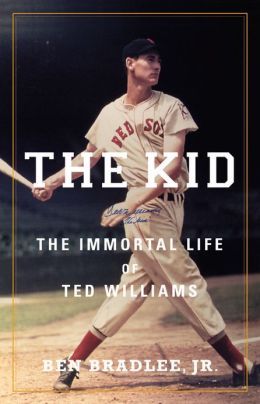Book Review: Hail to The Kid — Ted Williams
This expansive biography of Ted Williams is not awash in sentimentally, thanks to Ben Bradlee’s praiseworthy search for the facts, no matter where they lead, and his command of language, honed during his 25-year career as a reporter and editor at “The Boston Globe.”
The Kid: The Immortal Life of Ted Williams, by Ben Bradlee, Jr. Little, Brown and Company, 864 pages, $35.
By Robert Israel
Ben Bradlee, Jr.’s biography of Ted Williams (1918-2002) can be enjoyed on many levels. It is a marvelous saga about a complicated but flawed hero. It is a baseball book that sheds considerable light on the sport. It is a dynamic piece of reportage: Bradlee interviewed 600 people, many whom had never spoken on the record before about their encounters, relationships, and memories of Williams. Finally, the volume is a damn good read: solidly, painstakingly, and splendidly crafted by an author who knows how to tell a story and who writes with an enviable aplomb.
The Kid also kindles memories among members of a certain age group who lived through a time when we hungrily scanned the evening newspaper for newsy tidbits about our favorite sports figures. We idolized these men. We viewed them, as Bradlee’s title states, as “immortal” because of their athletic prowess and charisma. We knew nothing of the contentious relationships that took place in the clubhouses, in the press boxes, and beyond. It’s not like today, where sordid tales are front page news, from steroid abuse to mega-million salary disputes. The blush was on the rose back then. As star-struck youngsters, we’d head to corner drug stores to purchase Topps baseball cards – those cardboard squares smelled of bubblegum and were emblazoned with images of our heroes on one side, rows of statistics on the other. At sidewalk gatherings we pitched these cards against tenement stoops; if your card landed on top, you won the cards beneath it. Today these same pitch cards fetch wads of cash at memorabilia conventions; Bradlee’s book, I predict, will be eagerly embraced by these readers.
Author Bradlee speaks to fans of yesteryear because he is one. He has said that he was inspired to write this biography out of an early adoration of Williams. He described his bedroom back then as a shrine, “absolutely plastered with posters of Teddy Ballgame,” one of the many nicknames given to Williams (Splendid Splinter, Thumper, and The Kid were others). “I had a pen and ink drawing of Williams in repose, and that drawing anchored my bedroom,” Bradlee has admitted. After games at Fenway Park, Bradlee waited patiently with a group of “screaming brats,” to use his words, to procure the ace’s autograph. Bradlee recalled that Williams insisted on lining him and the other “brats” in orderly fashion outside the stadium before agreeing to sign their baseballs or pitch cards. To this day, some fifty years later, Bradlee, in a video clip on his website, treats that autographed baseball with reverence, a precious artifact from an early chapter of his life.
But the book is not awash in sentimentally, thanks to Bradlee’s praiseworthy search for the facts, no matter where they lead, and his command of language, honed during his 25-year career as a reporter and editor at The Boston Globe. I met him there, having been invited by then-editor Matt Storin in the late 1990s to work as a correspondent and copy editor. I can attest to Bradlee’s being a tireless, intense, passionate professional: a perfectionist. “He’s such a damn good reporter, I nag him sometimes to write the piece already, but he won’t until he’s good and ready,” one editor not known for patience told me. This explains why Bradlee (whose father served as chief editor at The Washington Post), who had initially agreed to complete the Williams book in two years, spent a total of eleven years writing it.
We learn of Williams’s unhappy early life in San Diego and the Mexican heritage, from his mother’s side, that he kept hidden from public view. Bradlee shares details about his volatile temper, his failed marriages, his disdain for the “Knights of the Keyboard” (the press), and the quiet way he worked to help sick children through The Jimmy Fund, never seeking the kind of adoring fanfare many athletes seek today. And we learn of his driven, monomaniacal quest to be the best; his 521 home runs; his epic 1941 season in which he hit 406; his 482 on base percentage. There are also the descriptions – reported ad nauseum in the press – detailing how his final remains were prepared at a cryonics facility in Arizona. Readers are advised to regard these events as the tragic/macabre post mortem to Williams’s life; there are more than enough anecdotes in this fascinating book to compensate.
In a recent portrait of composer/lyricist Stephen Sondheim for New York magazine, former New York Times theater critic Frank Rich wrote: “We tend to outgrow our early tastes and heroes.” Despite that inevitably, Rich confesses that he has remained a Sondheim fan for decades. Bradlee’s hero worship of Ted Williams is also untarnished: he’s still the kid who takes pride in an autographed baseball he procured from a hero he waited for outside Fenway Park. But in this biography he’s combined that nostalgia with a professionalism dedicated to objectivity and readability.
Robert Israel writes about theater, travel and the arts, and is a member of Independent Reviewers of New England (IRNE). He can be reached at risrael_97@yahoo.com



